|
|
|
Sort Order |
|
|
|
Items / Page
|
|
|
|
|
|
|
| Srl | Item |
| 1 |
ID:
167188
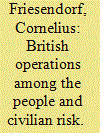

|
|
|
|
|
| Summary/Abstract |
Debates on military intervention and small wars often include the claim that soldiers should operate among civilians in order to avoid civilian casualties and to protect civilians against third-party violence. This article, by contrast, points at negative unintended consequences of military operations taking place in close proximity to local populations: it argues that also risk-tolerant militaries cause civilian casualties and that their presence triggers third-party violence against civilians. The British military, in particular the British Army, exported risk-tolerant practices from Northern Ireland to the Balkans, with sporadic success. But in southern Iraq and in Helmand, British ground operations harmed civilians. The findings suggest that the chances for protection are better in operations where levels of violence are relatively low than in counterinsurgency where troops face ruthless and well-endowed enemies operating among civilians.
|
|
|
|
|
|
|
|
|
|
|
|
|
|
|
|
| 2 |
ID:
123001
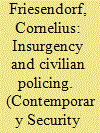

|
|
|
|
|
| Publication |
2013.
|
| Summary/Abstract |
Effective and legitimate policing is a necessary condition for the sustainable stabilization of war-torn countries. A crucial dilemma faced by international donors is whether to promote militarized or civilian policing. Particularly with insurgency and terrorism, police need robust capabilities to defend themselves and citizens against violence. At the same time, militarized police forces with weak oversight may fail to use proportionate force and serve the public. Little is known about management of this dilemma. This article argues that three established explanations - local security threats, international norms, and the political systems of donor states - do not determine the shape of police assistance programmes. Rather, the organizational cultures of donor police forces most crucially influence whether donors prioritize civilian or militarized police assistance. German support for the Afghan National Police (ANP) is a case in point. Despite deteriorating security and American pressure to support counterinsurgency, German police advisors stuck with a civilian policing model, due to their own organizational culture. Planners of foreign missions should better anticipate the organizational biases of specific donor agencies, this article concludes, to avoid frustration during the implementation phase.
|
|
|
|
|
|
|
|
|
|
|
|
|
|
|
|
| 3 |
ID:
084587
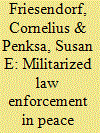

|
|
|
|
|
| Publication |
2008.
|
| Summary/Abstract |
The militarization of law enforcement has been a major feature of post-cold war international security: domestically, at borders and as part of peace operations. In post-war interventions, international military forces are confronted with tasks ranging from crowd and riot control and the arrest of suspect war criminals to the fight against organized crime. This article analyses and explains the militarization of law enforcement in Bosnia and Herzegovina, with a focus on the European Union Force (EUFOR). After taking over from NATO's Stabilization Force (SFOR), which had gradually and reluctantly become involved in law enforcement, EUFOR expanded counter-crime efforts. In its second term, EUFOR scaled down such engagement. We explain these dynamics by pointing to three interrelated factors: the role of individuals, the evolution of regional institutions and changing perceptions of crime and the rule of law.
|
|
|
|
|
|
|
|
|
|
|
|
|
|
|
|
| 4 |
ID:
101816
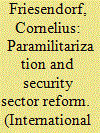

|
|
|
|
|
| Publication |
2011.
|
| Summary/Abstract |
An accelerating trend to establish paramilitarized security forces has been occurring in peace operations to help fill security gaps. But the practice is problematic from a security sector reform (SSR) point of view, because SSR aims at distinguishing between the military and the police and at promoting civilian policing. This article shows that while the SSR concept leaves room for paramilitarization, it demands much caution. The paramilitarization of regular police forces is incompatible with even a flexible interpretation of SSR principles. The US-driven paramilitarization of the Afghan National Police (ANP), reflecting a search for quick fixes, is a dramatic case in point.
|
|
|
|
|
|
|
|
|
|
|
|
|
|
|
|
| 5 |
ID:
078778
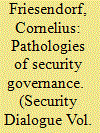

|
|
|
|
|
| Publication |
2007.
|
| Summary/Abstract |
The trafficking of women and girls for the purpose of sexual exploitation has reportedly been booming in Europe since the 1990s. Governments, international organizations, and private actors have addressed the causes and consequences of sex trafficking in various ways. This article shows that the concept of security governance helps to understand efforts against human trafficking and their shortcomings. The anti-trafficking security governance system consists of five approaches: legal measures, prosecution, protection, prevention in countries of origin, and prevention in countries of destination. Although progress has been made, the security governance system is marked by several pathologies, especially a lack of programs that prevent trafficking in countries of origin and destination, insufficient protection for trafficked persons, and deficient networks bringing together the various actors involved in anti-trafficking. To make governance against human trafficking more effective, efficient, and just, the security governance system must be better balanced and networked
|
|
|
|
|
|
|
|
|
|
|
|
|
|
|
|
| 6 |
ID:
144062
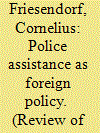

|
|
|
|
|
| Summary/Abstract |
Police assistance is an important, albeit understudied aspect of foreign policy. While many scholars have studied international and transnational policing, it remains largely unknown why donor police forces often support their colleagues in fragile states in different ways. This article discusses a variety of potential explanations of police assistance: a domestic rational actor model; a constructivist focus on international norms; and theories on the use of force by democracies. While all of these explanations are relevant, this article shows that they remain incomplete without studying police organisations and how these implement assistance on the ground. As the organisational cultures of donor police agencies differ, so do their assistance practices. The case of German and Italian police assistance in Afghanistan illustrates the relevance of an organisational approach: despite operating in the same environment, German police officers promoted civilian and Italian Carabinieri militarised policing. The article stresses that explaining security assistance, an important form of indirect intervention in fragile states, requires zooming in on policy implementation and policy implementers.
|
|
|
|
|
|
|
|
|
|
|
|
|
|
|
|
| 7 |
ID:
187055
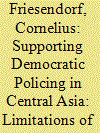

|
|
|
|
|
| Summary/Abstract |
Critics have argued that the provision of support by the Organization of Security and Co-operation in Europe (OSCE) to Central Asian police risks reinforcing authoritarianism. This article examines OSCE police-related activities in Kyrgyzstan, Uzbekistan and Tajikistan during the 2010s, highlighting persistent gaps between the OSCE’s commitment to democratic policing and OSCE practices on the ground. It identifies two institutional mechanisms that skew implementation in favour of Central Asian governments: micromanagement by participating states and implementers’ adaption to institutional environments that are not conducive to democratic police governance. Police-related activities in Central Asia showcase the limitations and risks of providing international support to the security sectors of non-liberal states.
|
|
|
|
|
|
|
|
|
|
|
|
|
|
|
|
|
|
|
|
|